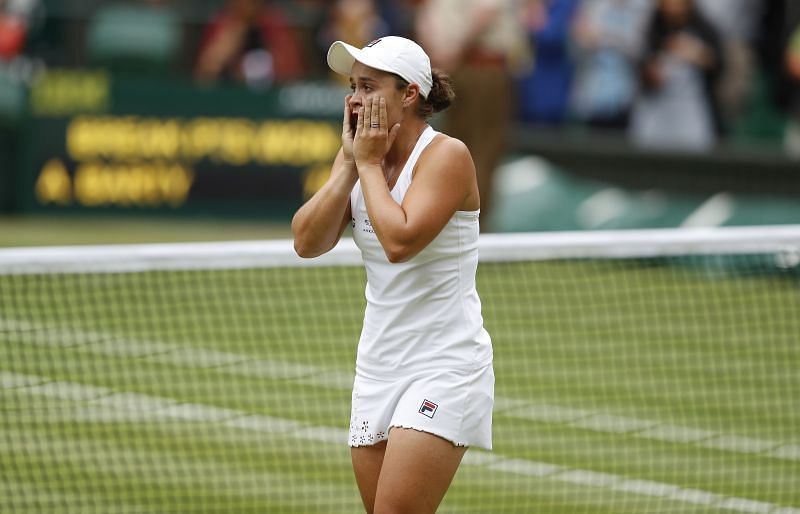
Ashleigh Barty is incredibly hard to beat, and also incredibly hard to put into a box
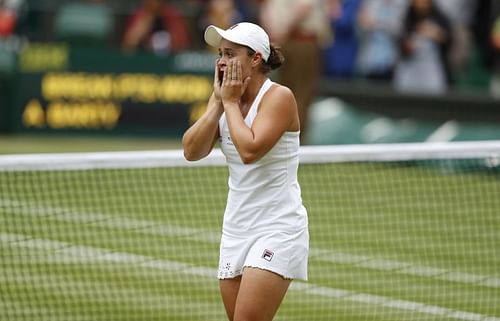
Ashleigh Barty is a tough player to describe.
She is just 5'5" tall but isn't a defensive counterpuncher. She is a traditionalist at heart but has no trouble skipping Major tournaments - or even the sport as a whole - when she isn't feeling up to playing. She is the World No. 1 and now Wimbledon champion, but not the most popular or even well-known player among the sport's fans.
Is that because she doesn't fit into any of the boxes that we subconsciously create for our idols?
For much of the fortnight leading up to Ashleigh Barty's win over Karolina Pliskova in the Wimbledon final on Saturday, the talk among fans was about how Barty had a 'boring' personality. While the Aussie went about her business quietly, dismantling one opponent after another, most of the public attention was centered around Aryna Sabalenka's shriek-filled breakthrough and Ons Jabeur's inspiring run.
That probably didn't matter to Barty, since she ended up lifting the trophy on the final weekend. Wimbledon was a long-standing dream for the 25-year-old, and you could see how much the title meant to her as she let her emotions out in full force on wrapping up championship point.
But as she wiped away the tears and smiled - for the cameras, but also for herself and her team - it struck me that we probably don't realize how lucky we are to have her at the top of the sport.
Ashleigh Barty's multi-faceted game is its own reward
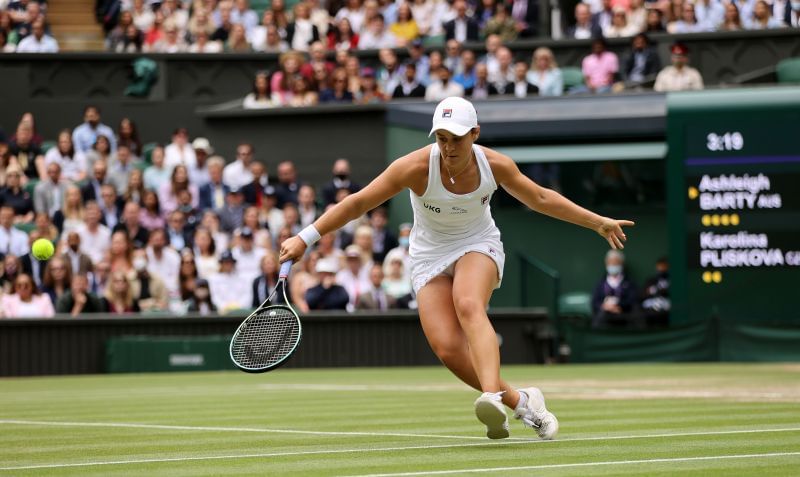
Ashleigh Barty is many things, especially so as a player. Her game is made up of several small components that don't look too impressive on their own, but when added up to a whole become a force that is difficult to counter.
There is the forehand firepower, the finesse off the backhand slice and volley, the defensive speed and acumen, and perhaps most significantly, the serve that can put any giant to shame. That last bit shouldn't really be possible given Barty's height, and yet it is; we've seen countless matches where her serve has been the single-biggest difference-maker.
Even in the match against 'Ace Queen' Karolina Pliskova, it was Ashleigh Barty who was more reliable on serve. She out-aced the Ace Queen seven to six and got broken two times fewer, the latter of which was especially crucial in the decider.
Admittedly, the decider didn't seem necessary at first - not when Barty won the first 14 points of the match to prompt talks of a 'golden set', and definitely not when she served for the match at 6-5 in the second set. But the Aussie's choke - coupled with some incredible back-to-the-wall resistance from Pliskova - ensured that the Centre Court crowd got its first three-set women's final since 2012.
The match never really reached a consistent tempo though, which can partly be attributed to Pliskova's stand-and-deliver, rhythm-less game. But part of it was also due to the fact that Barty struggled to find her best tennis for much of the last two sets.
Maybe the finish line being in sight was what tightened Barty's arm, or maybe it was just that two weeks of toil had caught up to her. Still, the Aussie never stopped fighting or running, even after Pliskova took the second in a high-octane tiebreaker.
As it turned out, Barty's base level would be high enough for her to cruise through the third. She elongated just enough points to elicit errors from Pliskova on the big points, and after overcoming another small hiccup at 5-3, eventually served it out.
That Ashleigh Barty was able to win despite playing well below her best is testament to her versatile game, but also a terrific advertisement of her fighting spirit. The 25-year-old has many different ways to hurt you on the court, and that includes being able to hit the reset button after a setback.
A woman for all surfaces and seasons
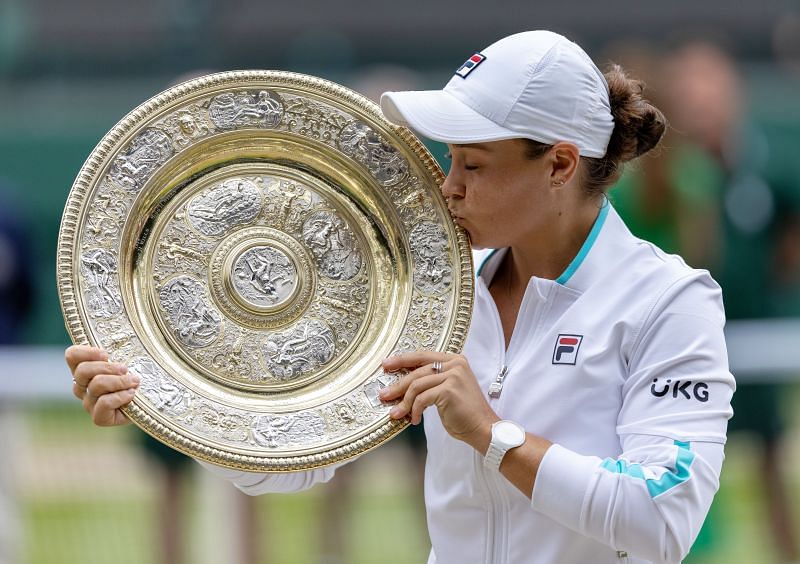
Ashleigh Barty's personality might be just as multi-faceted as her game, even if it may not seem so at first glance.
Barty is as Australian as anyone, belonging to the indigenous Ngarigo community. But she is not typically 'Aussie' in the way that other athletes from the country appear to us outsiders. Barty doesn't have the ruthlessness of, say, Ricky Ponting; you can't possibly imagine her ever 'sledging' her opponents, either on the court or off it.
Instead, Barty is mild-mannered, courteous and polite - almost too polite, according to some. And you'll struggle to find a single press conference of hers where she doesn't refer to her opponent as one of the best players in the world.
At the Australian Open back in February, the 25-year-old was leading Karolina Muchova in the quarterfinals by a set and a break. But a dubious medical timeout by the Czech turned the match around, and Barty ended up losing in three sets.
Other players might have questioned the opponent's intentions in such a situation; Ajla Tomljanovic certainly did when Jelena Ostapenko took a medical timeout during their third-round match just last week. But Barty only blamed herself during her presser; instead of blaming or accusing Muchova of anything, she merely said she was "disappointed that she let that become a turning point".
Ashleigh Barty doesn't do controversy. She stays as far away from conflicts and scandals as her compatriot Nick Kyrgios stays from Novak Djokovic's social circle. In fact, her seemingly meek nature sometimes makes you wonder whether she has any competitive fire at all.
And yet she does have a lot of competitive fire, which is evident in the way she fights on the court and also in the way she talks about her well-earned achievements. A few months ago there were murmurs in the tennis community that Ashleigh Barty wasn't worthy of the World No. 1 ranking while four-time Slam champion Naomi Osaka was around. Barty's response at the time?
"I never have to prove anything to anyone (about the No. 1 ranking). I know all the work that I do with my team, behind the scenes. But, you know, I didn't play at all last year. And I didn't improve any of my points whatsoever. And there were girls who had the chance to improve there. So I felt like I thoroughly deserve my spot at the top of the rankings."
If there were any doubts whether Ashleigh Barty deserved the No. 1 ranking back then, there can't possibly be any right now. The Aussie has walked the talk with aplomb over the last six months, winning big titles on all three surfaces (Miami - hardcourt, Stuttgart - clay and Wimbledon - grass).
Barty is by far the most consistent WTA player we've had since Serena Williams' peak years, and arguably the strongest World No. 1 since Angelique Kerber in 2016. She truly stands out from most recent WTA champions - with her nuanced game that relies more on touch than ball-bashing, her refusal to accompany each shot with a piercing shriek, and her commitment to the week-to-week grind of the tour.
How high can Ashleigh Barty fly?
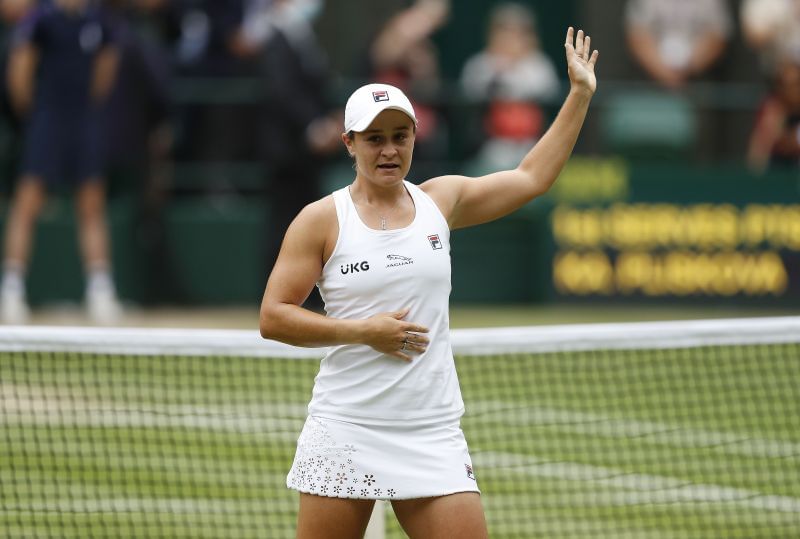
Ashleigh Barty has been in our consciousness for a long time already, but somehow it feels like she's just getting started. There are just so many avenues and possibilities at her disposal that it is hard to predict what new mountain she will scale next.
Barty's 2014-2016 break from tennis - and subsequent foray into cricket - has been so widely publicized that we're almost tired of hearing about it. But it does serve as an important reminder that the Aussie is not someone who will shy away from difficult decisions.
Naomi Osaka may be the face of mental health awareness in tennis right now, but Ashleigh Barty has been quietly doing her bit too. Aside from that cricket 'break', Barty also made it a point to prioritize her health and safety above ranking points or trophies in the second half of 2020.
For a woman who won her first Slam at Roland Garros despite having a game that was seemingly tailor-made for quicker surfaces, perhaps her decision to go against the herd shouldn't have come as a surprise. The Aussie is nothing if not a mold-breaker, and there's no telling what will come next in her joy-ride of a journey.
Ashleigh Barty is many things, and she can be whatever we want her to be. Maybe that should be our cue to not try and force her into any box, and instead celebrate everything that she brings to the table.